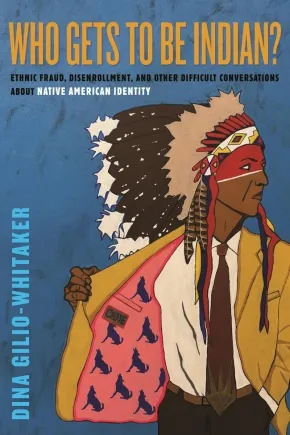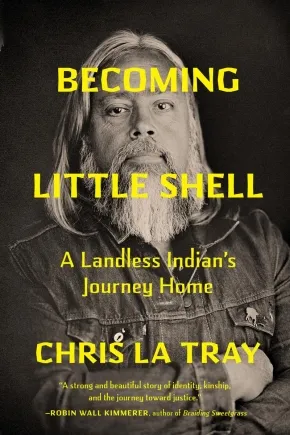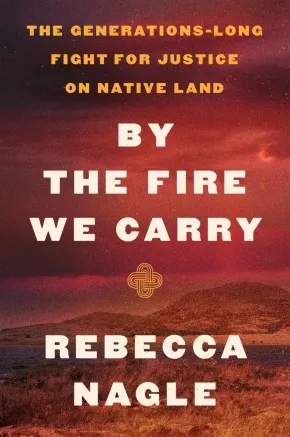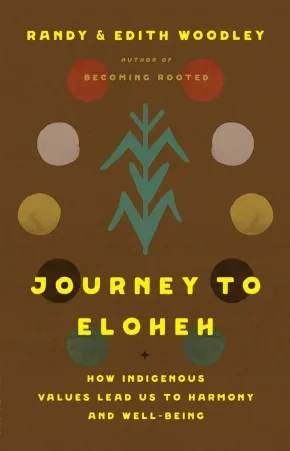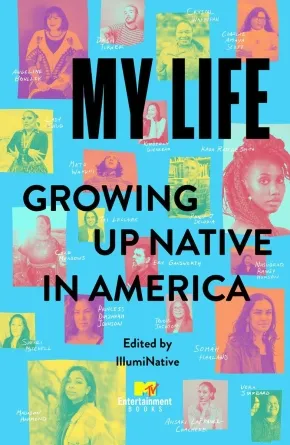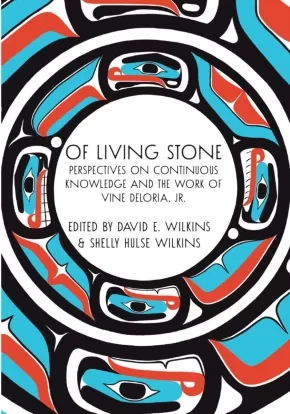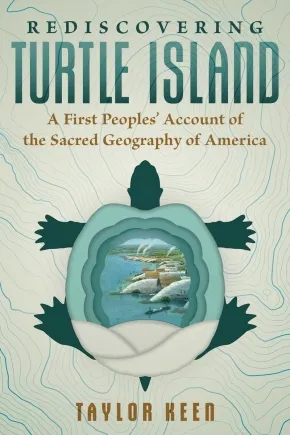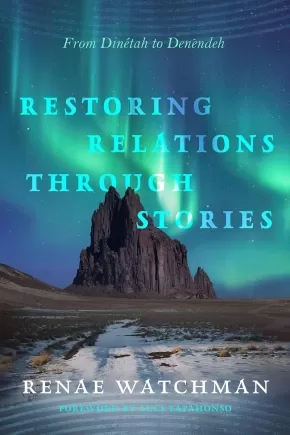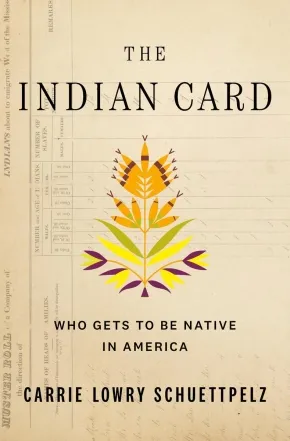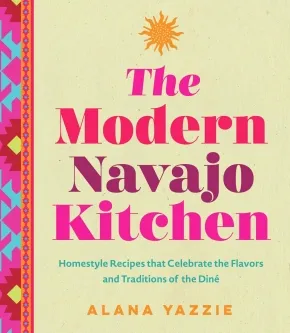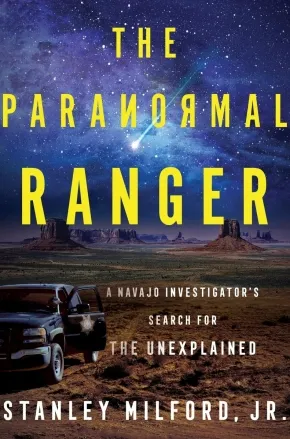
Indigenous Peoples in the United States
16
-
30
of
125 Results;
Sort By
Go To
of 9
The Water Remembers: My Indigenous Family's Fight to Save a River and a Way of Life
$40.00
Format:
Hardcover
Text Content Territories:
Indigenous American; Native American; Yurok;
Reading Level: N/A
ISBN / Barcode: 9780316568951
Synopsis:
Synopsis:
A moving multigenerational memoir of Indigenous resistance, environmental justice, and a Yurok family's fight to protect their legacy and the Klamath River.
For the members of a Northern California tribe, salmon are the lifeblood of the people—a vital source of food, income, and cultural identity. When a catastrophic fish kill devastates the river, Amy Bowers Cordalis is propelled into action, reigniting her family's 170-year battle against the U.S. government.
In a moving and engrossing blend of memoir and history, Cordalis propels readers through generations of her family’s struggle, where she learns that the fight for survival is not only about fishing—it’s about protecting a way of life and the right of a species and river to exist. Her great-uncle's landmark Supreme Court case reaffirming her Nation’s rights to land, water, fish, and sovereignty, her great-grandmother’s defiant resistance during the Salmon Wars, and her family's ongoing battles against government overreach shape the deep commitment to justice that drives Cordalis forward.
When the source of the fish kill is revealed, Cordalis steps up as General Counsel for the Yurok Tribe to hold powerful corporate interests accountable, and to spearhead the largest river restoration project in history. The Water Remembers is a testament to the enduring power of Indigenous knowledge, family legacy, and the determination to ensure that future generations remember what it means to live in balance with the earth.
Reviews
"A powerful interweaving of memory, history, and activism, The Water Remembers is a lyrical and uncompromising account of Amy Bowers Cordalis’s fight to protect the Klamath River and the sovereignty of the Yurok Nation. Told through a Yurok storytelling lens, this book traverses ancestral knowledge, ecological devastation, and legal resistance, revealing the sacred bond between people and river. Bowers Cordalis, an attorney and lifelong fisherwoman, writes with the clarity of lived experience and the heart of a riverkeeper. This is a vital work of Indigenous resurgence and environmental justice, brimming with spirit, truth, and unstoppable resolve."—Terese Marie Mailhot, author of Heart Berries
"The Water Remembers is a powerful, poetic testament to Indigenous resilience and reverence for the natural world. Amy Bowers Cordalis weaves history, activism, and sacred connection into a compelling narrative of communities fighting to protect what is most vital. This book is not just a call to action; it’s a song of survival and restoration."—Leah Thomas, environmental educator and author of The Intersectional Environmentalist
Additional Information
288 pages | 6.00" x 9.25" | Hardcover
Who Gets to Be Indian?: Ethnic Fraud, Disenrollment, and Other Difficult Conversations About Native American Identity
$39.95
Format:
Hardcover
Text Content Territories:
Indigenous American; Native American;
Reading Level: N/A
ISBN / Barcode: 9780807044964
Synopsis:
Synopsis:
An investigation into how Native American identity became a commodity, from cultural appropriation to ethnic fraud to disenrollment
Settler capitalism has been so effective that the very identities of Indigenous people have been usurped, misconstrued, and weaponized. In Who Gets to Be Indian?, scholar and writer Dina Gilio-Whitaker (Colville Confederated Tribes) explores how ethnic fraud and the commodification of Indianness has resulted in mass confusion about what it means to be Indigenous in the United States.
As an entry point to the seemingly intractable problem of ethnic fraud, Gilio-Whitaker critically looks to the film industry, including a case study of Sacheen Littlefeather, who is most known as the Native American woman that rejected an Oscar on behalf of Marlon Brando in 1973—though later revealed, she was not who she said she was. Gilio-Whitaker argues that this pretendian phenomenon originated in Southern California when the United States was forcing assimilation of Indians into white America culturally, but also into its capitalist economic system. With Indianness becoming a marketized commodity in the Hollywood film business, the field became open to anyone who could convincingly adopt an Indian persona.
Deeply researched using socio-historical analysis, Gilio-Whitaker offers insights from her own experiences grappling with identity to provide clarity and help readers understand how the commodification of Indianness have ultimately left many people of legitimate American Indian heritage to be disconnected from their tribes. Personal and compelling, Gilio-Whitaker takes settler capitalism to task and helps us better understand how we got here in order to counteract the abuses of pretendianism and disenrollment.
Reviews
“This incendiary j’accuse isn’t afraid to name names.”—Publishers Weekly, Starred Review
“With clarity and conviction, Dina Gilio-Whitaker exposes what’s at stake for Native people when Indianness becomes a commodity. A sharp, personal, and urgent look at the high cost for actual Native people in a system built to exploit them at every turn.”—Kim TallBear, author of Native American DNA: Tribal Belonging and the False Promise of Genetic Science
“Indigeneity is caught between truth tellers and tricksters. With abiding concern for tribal nationhood, Dina Gilio-Whitaker boldly espouses our truths while confronting the tricksters among us. Indigenous America needs more truth tellers like her and books like this.”—Gabe Galanda, Indigenous rights attorney
“Dina Gilio-Whitaker’s Who Gets to Be Indian? tackles the problem of the commodification of Native identity at a crucial moment in American history. With incisive analysis, Gilio-Whitaker reveals how settler capitalism has distorted and exploited Indigenous identities and exposes the roots of folks pretending to be Native and its harms to Native communities. This book is a call to action and a vital tool for understanding how we can protect Indigenous people. A must-read for anyone seeking to confront the complexities of Native identity, sovereignty, and power in America.”—Liza Black, author of Picturing Indians: Native Americans in Film, 1941–1960
“A fresh and unflinching look into the rise of pretendianism—when it became normalized for Hollywood to grant Native American identities to various grifters. Dina Gilio-Whitaker’s courageous and original analysis will challenge readers, Indigenous or not, to think deeply about the nature of settler colonialism today.”—Darryl Leroux, author of Distorted Descent: White Claims to Indigenous Identity
Additional Information
280 pages | 6.22" x 9.30" | Hardcover
Becoming Little Shell: A Landless Indian's Journey Home
$42.95
Format:
Hardcover
Text Content Territories:
Indigenous American; Native American; Anishinaabeg; Ojibwe (Chippewa); Little Shell Tribe of Chippewa Indians ;
Reading Level: N/A
ISBN / Barcode: 9781571313980
Synopsis:
Synopsis:
Growing up in Montana, Chris La Tray always identified as Indian. Despite the fact that his father fiercely denied any connection, he found Indigenous people alluring, often recalling his grandmother’s consistent mention of their Chippewa heritage.
When La Tray attended his grandfather’s funeral as a young man, he finally found himself surrounded by relatives who obviously were Indigenous. “Who were they?” he wondered, and “Why was I never allowed to know them?” Combining diligent research and compelling conversations with authors, activists, elders, and historians, La Tray embarks on a journey into his family’s past, discovering along the way a larger story of the complicated history of Indigenous communities—as well as the devastating effects of colonialism that continue to ripple through surviving generations. And as he comes to embrace his full identity, he eventually seeks enrollment with the Little Shell Tribe of Chippewa Indians, joining their 158-year-long struggle for federal recognition.
Both personal and historical, Becoming Little Shell is a testament to the power of storytelling, to family and legacy, and to finding home. Infused with candor, heart, wisdom, and an abiding love for a place and a people, Chris La Tray’s remarkable journey is both revelatory and redemptive.
Reviews
“La Tray’s pride and conviction will have readers eager not only to learn more, but to take action. A brilliant contribution to the canon of Native American literature.”—Kirkus Reviews, starred review
“[A] gripping debut memoir. [. . .] La Tray’s crystalline prose and palpable passion for spreading Indigenous history bolster his account. Readers will be fascinated.”—Publishers Weekly
"Heartbreaking, infuriating, and remarkable, Becoming Little Shell is a memoir that’s packed with historical details,transcending and amplifying a personal quest to understand a family’s past."—Foreword Reviews, starred review
“Smart, emotional, and bracingly honest, La Tray is a powerful storyteller who should have significant appeal.”—Booklist
“I’m in awe of Chris La Tray’s storytelling. Becoming Little Shell creates a multilayered narrative from threads of personal, family, community, tribal, and national histories. Together they make a story as strong and beautiful as a Metis sash—a story of identity, kinship, and the journey toward justice.”—Robin Wall Kimmerer, author of Braiding Sweetgrass
“Chris La Tray is a powerful voice—a force of nature, really—to guide us through the swirling confluence of Native and white worlds, both past and present. Becoming Little Shell is the American story of our era—tracing the arc of its author brought up in the white world before discovering his roots as an original inhabitant of this continent.”—Peter Stark, author of Gallop Toward the Sun
“Indigenous identity can be complicated, and Becoming Little Shell compels us into the thick of it—Native people dispossessed of not just land but recognition; blood quantum laws originally crafted to complete a genocide and still wreaking havoc in identity debates today; racism that drove many Native people to disassociate from their families; and descendants, like La Tray, who have found their way back, fighting for the reconnection of their communities and for the observance of their very existence. La Tray is a loving, discerning, curious, funny, and generous guide. This is a beautiful, big-hearted book.”—Sierra Crane Murdoch, author of Yellow Bird
“Becoming Little Shell is a moving, deeply felt, and incredibly detailed account of Chris La Tray’s search for his origins among the Métis, Pembina, and Little Shell Tribe of Chippewa Indians. Combining memoir, history, interviews, and travel, La Tray gives us nothing less than the history of a people in the form of an absorbing and emotionally searing memoir. This book will, without a doubt, become a classic in Native American literature. Must read.”—David Treuer, author of The Heartbeat of Wounded Knee
“What I appreciate so much about Chris La Tray’s writing on Indigenous identity and history is the wit, clarity, and integrity embodied in every word. Becoming Little Shell beautifully encompasses a journey that we can all learn from, a journey toward asking better questions about land, belonging, and connection, and through this book La Tray epitomizes historian, poet, and teacher. Full of Indigenous history, personal stories, and the complex dance between the two, La Tray reminds us that the journey of finding ourselves and making sense of the way colonialism plays out around us is an essential part of being human. Please read this book. You’ll be so glad you did.”—Kaitlin B. Curtice, author of Living Resistance
Additional Information
320 pages | 6.00" x 9.00" | Hardcover
By the Fire We Carry: The Generations-Long Fight for Justice on Native Land
$39.50
Format:
Hardcover
Text Content Territories:
Indigenous American; Native American; Muscogee (Creek); Cherokee; Cherokee Nation (Cherokee Nation of Oklahoma);
Reading Level: N/A
ISBN / Barcode: 9780063112049
Synopsis:
Synopsis:
A powerful work of reportage and American history that braids the story of the forced removal of Native Americans onto treaty lands in the nation’s earliest days, and a small-town murder in the ‘90s that led to a Supreme Court ruling reaffirming Native rights to that land over a century later.
Before 2020, American Indian reservations made up roughly 55 million acres of land in the United States. Nearly 200 million acres are reserved for National Forests—in the emergence of this great nation, our government set aside more land for trees than for Indigenous peoples. That changed on July 9, 2020, when a high-profile Supreme Court case—which originated with a small-town murder two decades earlier—affirmed the reservation of Muscogee Nation. The ruling resulted in the largest restoration of tribal land in U.S. history, merely because the Court chose to follow the law.
In the 1830s Muscogee people were rounded by the US military at gunpoint and forced into exile halfway across the continent. At the time, they were promised this new land would be theirs for as long as the grass grew and the waters ran. But that promise was not kept. When Oklahoma was create on top of their land, the new state claimed their reservation no longer existed. Over a century later, when a Muscogee citizen was sentenced to death for murdering another Muscogee citizen, his defense attorneys argued the murder occurred on the reservation of his tribe, and therefore Oklahoma didn’t have the jurisdiction to execute him. Oklahoma argued that reservation no longer existed. In the summer of 2020, the Supreme Court said: no more; a ruling that would ultimately underpin multiple reservations covering half the land in Oklahoma, including Nagle’s own Cherokee Nation.
Here Rebecca Nagle tells the story of the generations-long fight for tribal land and sovereignty in Eastern Oklahoma. By chronicling both the contemporary legal battle and historic acts of Indigenous resistance, By the Fire We Carry stands as a landmark work of American history. The story it tells exposes both the wrongs that our nation has committed in its long history of greed, corruption and lawlessness, and the Native battle for the right to be here that has shaped our country.
Educator Information
By the Fire We Carry is hard-hitting American history that expands on the nation's story. It tells of the treatment of Native Americans, their removal and displacement, and the genocide committed against them by the US government from their viewpoint.
Additional Information
352 pages | 6.00" x 9.00" | 23 b/w photographs and maps | Hardcover
Fur Trade Nation: An Ojibwe's Graphic History
$42.16
Format:
Hardcover
ISBN / Barcode: 9781962910002
Synopsis:
Synopsis:
We clothed the royals. We fed the worker. We guided the traveler. We abetted the soldier. We are not afraid to love. So begins Carl Gawboy's groundbreaking graphic history of the Fur Trade Era. From 1650 to 1850, the Ojibwe Nation was the epicenter of the first global trading network. Trade goods from Africa, Asia, Europe, and South America flowed into the Great Lakes region, floating along Ojibwe waterways in birchbark canoes paddled by mixed-race Voyageurs. Gawboy offers a fresh perspective on the fur trade era, placing Ojibwe technology, kinship systems, cultural paradigms, and women at the heart of this remarkable era, where they have always belonged.
Additional Information
202 pages | 8.25" x 11.00" | Hardcover
Jeremy Frey: Woven
$67.50
Format:
Hardcover
Text Content Territories:
Indigenous American; Native American; Passamaquoddy (Peskotomuhkati);
ISBN / Barcode: 9780847899708
Synopsis:
Synopsis:
The only book on award-winning Indigenous basket maker Jeremy Frey, accompanying his first major traveling exhibition.
Frey (Passamaquoddy) is one of the most respected Indigenous basket makers working today. Descended from a long line of basket makers, his work is known for its intricate design and exquisite artistry, which reflect both traditional techniques and his own creative vision.
This catalogue considers his work from a variety of perspectives. Secord, whom Frey credits for guiding his career as the founder of Maine Indian Basketmakers Alliance, contributes a detailed biographical essay. DeSimone situates Frey’s work in the broader field of contemporary art, with a specific focus on the new video work he is making for the exhibition. Hoska focuses on Frey’s art in the broader context of Native basket and fiber arts. And Mize considers the ways in which his expanding practice registers ecological knowledge, time, and the impact of climate change.
Additional Information
160 pages | 8.85" x 11.91" | Hardcover
Journey to Eloheh: How Indigenous Values Lead Us to Harmony and Well-Being
$37.99
Format:
Hardcover
Text Content Territories:
Indigenous American; Native American; Shoshone; Eastern Shoshone Tribe; Cherokee; United Keetoowah Band ;
ISBN / Barcode: 9781506496979
Synopsis:
Synopsis:
Rooted in ten Indigenous values, this thoughtful, holistic book-written by Randy Woodley, a Cherokee descendant recognized by the Keetoowah Band, and Edith Woodley, an Eastern Shoshone tribal member-helps readers learn lifeways that lead to true wholeness, well-being, justice, and harmony.
The pursuit of happiness, as defined by settlers and enshrined in the American Dream, has brought us to the brink: emotionally, spiritually, socially, and as a species. We stand on a precipice, the future unknown. But Indigenous people carry forward the values that humans need to survive and thrive. In Journey to Eloheh, Randy and Edith Woodley help readers transform their worldviews and lifestyles by learning the ten values of the Harmony Way. These ten values, held in common across at least forty-five Indigenous tribes and nations, can lead us toward true well-being: harmony, respect, accountability, history, humor, authenticity, equality, friendship, generosity, and balance. By learning, converting to, and cultivating everyday practices of Eloheh--a Cherokee word meaning harmony and peace--we have a chance at building well-being and a sustainable culture.
In this riveting account of their own journeys toward deepening their indigeneity and embodying harmony, Edith, an activist-farmer, and Randy, a scholar, author, teacher, and wisdom-keeper, help readers learn the lifeways of the Harmony Way. The journey to Eloheh holds promise for all of us, Indigenous or not.
We know the Western worldview is at odds with a sustainable Earth, a just common life, and personal well-being. Together we can convert to another way of living--one that recognizes the Earth as sacred, sees all creation as related, and offers ancestral values as the way forward to a shared future.
Reviews
"Edith and Randy Woodley's passion and persistence to create spaces of community and care are inspiring. A blend of storytelling, theology, and guidance harvested directly through Indigenous wisdom, Journey to Eloheh reminds us to stay true to the path of kinship and belonging, and to never give up on justice and peacemaking in the world. I highly recommend this book for anyone who is searching for a way to be a better relative on this earth or to fight for a better reality for future generations. This book will help you get there." --Kaitlin B. Curtice, award-winning author of Native and Living Resistance
"Spiritual journey as autobiography: like a Navajo weaver, Journey to Eloheh skillfully connects Native American theology and personal experience into a way of life. If you are looking for your own path, Edith and Randy Woodley's story is a good place to begin." --Steven Charleston, author of Ladder to the Light, Spirit Wheel, and We Survived the End of the World
"There is so much we can all learn from the wisdom of Indigenous culture. In this book, Randy and Edith Woodley invite us to join them on a journey of learning a different way of living that leads to wholeness, abundance, and peace. They generously share their life experience and spiritual insights to show us a better path toward harmony with the whole of creation. I highly recommend it!" --Dr. Brenda Salter McNeil, author of Becoming Brave and Roadmap to Reconciliation 2.0
"A practical antidote to despair, hopelessness, and aimless consumption, this book offers a robust and healing path to well-being for all of us. The Woodleys are wise and trustworthy guides for restoration and embodied goodness within the community of creation." --Sarah Bessey, author of Field Notes for the Wilderness: Practices for an Evolving Faith
"Randy and Edith Woodley write with insight and wisdom from their years of experience. They have prophetic voices that draw attention to the needs of all of our relatives. Their voices rise out of difficult situations in which they have done more than survive; they are showing how to flourish in an ever-changing world." --Ray Aldred, director of the Indigenous Studies Program, Vancouver School of Theology
"For many years, I have considered Randy Woodley one of my teachers. His books, lectures, and personal conversations--together with his humble, yet bold, spirit as a teacher--have enriched and challenged me. His new book, co-written with his wise and eloquent wife, Edith, is a masterpiece, a book I would recommend to anyone and everyone. It beautifully combines the sharing of their life-story with the essence of their lifeway, articulated in ten powerful Indigenous values that are as deeply spiritual as they are deeply practical." --Brian McLaren, author, teacher, and activist
Educator Information
Keywords / Themes: Well-Being; the Harmony Way (Eloheh); Ten Eloheh Values; Indigenous Knowledge, Indigenous Values; Personal Growth.
Additional Information
264 pages | 5.75" x 8.75" | Hardcover
My Life: Growing Up Native in America
$38.99
Editors:
● IllumiNative (Indigenous;)
Format:
Hardcover
Text Content Territories:
Indigenous American; Native American;
ISBN / Barcode: 9781668021705
Synopsis:
Synopsis:
A moving collection of twenty powerful essays, poems, and more that capture and celebrate the modern Native American experience, featuring entries by Angeline Boulley, Madison Hammond, Kara Roselle Smith, and many more.
With heart, pathos, humor, and insight, twenty renowned writers, performers, athletes, and activists explore what it means to be Native American today. Through a series of essays and poems, these luminaries give voice to their individual experiences while shedding light on the depth and complexity of modern Native American identity, resiliency, and joy.
The topics are as fascinating and diverse as the creators. From Mato Wayuhi, award-winning composer of Reservation Dogs, honoring a friend who believed in his talent to New York Times bestselling author Angeline Boulley exploring what it means to feel Native enough, these entries are not only an exploration of community, they are also a call for a more just and equitable world, and a road map toward a brighter future.
Edited by IllumiNative, an organization dedicated to amplifying contemporary Native voices, My Life: Growing Up Native in America features contributions from Angeline Boulley, Philip J. Deloria, Eric Gansworth, Kimberly Guerrero, Somah Haaland, Madison Hammond, Nasugraq Rainey Hopson, Trudie Jackson, Princess Daazhraii Johnson, Lady Shug, Ahsaki Baa LaFrance-Chachere, Tai Leclaire, Cece Meadows, Sherri Mitchell, Charlie Amaya Scott, Kara Roselle Smith, Vera Starbard, Dash Turner, Crystal Wahpepah, and Mato Wayuhi.
Additional Information
224 pages | 5.50" x 8.37" | 16-pg b&w insert | Hardcover
Of Living Stone: Perspectives on Continuous Knowledge and the Work of Vine Deloria, Jr.
$43.95
Editors:
Format:
Paperback
Text Content Territories:
Indigenous American; Native American; Sioux; Lakota;
Reading Level: N/A
ISBN / Barcode: 9781682754665
Synopsis:
Synopsis:
Of Living Stone: Perspectives on Continuous Knowledge and the Work of Vine Deloria, Jr. is a collection of new essays on the legacy of Vine Deloria, Jr., one of the most influential thinkers of our time. This insightful collection features more than thirty original pieces, bringing together Tribal leaders, artists, scientists, activists, scholars, legal experts, and humorists. A group of French scholars offers surprising perspectives on Deloria’s continuing global influence. Readers will find thoughtful and creative views on his wide-ranging and world-changing body of work. Some build upon his ideas while others offer important criticisms. In addition to its content, this volume is unique in that it was designed to center the traditional exercise of continuous knowledge whereby information is routinely shared, considered, and pragmatically adapted as it flows between generations. In this way, people, ideas and traditions remain alive and relevant—not set in stone —as the past is honored by those living in the present as they prepare for the future.
The book includes contributions from a number of remarkable individuals, including:
- Climate expert Margaret Redsteer (Crow)
- Melanie Yazzie (Diné), host of The Red Power Hour podcast
- Cheryl Crazy Bull (Sicangu Lakota), president of the American Indian College Fund
- Activists Faith Spotted Eagle (Yankton Dakota) and Lauren Schad (Cheyenne River Lakota)
- Writer and producer Migizi Pensoneau (Ponca/Ojibwe)
- Environmental scientists Kyle Whyte (Citizen Potawatomi) and Ryan Emanuel (Lumbee)
- Experts on Tribal Governance Deron Marquez (Yuhaaviatam of San Manuel), Frank Ettawageshik (Little Traverse Bay), Norbert Hill (Oneida), Megan Hill (Oneida), and Marty Case.
- Artists Cannupa Hanska Luger (MHA-Three Affiliated Tribes) and James Johnson (Tlingit)
- Legal Scholars Sarah Deer (Muscogee), Rebecca Tsosie (Yaqui descent), and Gabe Galanda (Round Valley)
- Archaeologist Paulette Steeves (Cree-Metis)
- Scholars of Indigenous Traditions Noenoe Silva (Kānaka Maoli), Natalie Avalos (Chicana of Mexican Indigenous descent), Tom Holm (Cherokee), and Greg Cajete (Tewa-Santa Clara Pueblo).
Time magazine named Vine Deloria, Jr. as one of the greatest thinkers of the twentieth century, and his research, writings, and teachings on history, law, religion, and science continue to influence generations of Indigenous peoples and their allies across the world.
Reviews
“For me as a young person in the 1980s and 1990s, Vine was the only stranger I thought of as family. He was funny and heart-stabbingly blunt. So we have Vine Deloria to thank for revitalizing Indigenous knowledge gathering. Inspired by Vine’s life work, Anishinaabe people now understand that we learn by listening (bzindamowin), observing (gnawaaminjigewin), and ceremony (manidookewin). We also know it’s important to have a LOT of fun (miiziiwapine). Of Living Stone is both a somber memorial and a raucous celebration of Vine’s work.”—Matthew Fletcher (Grand Traverse Band of Ottawa and Chippewa Indians), University of Michigan, and author of The Ghost Road
Additional Information
528 pages | 6.00" x 9.00" | Paperback
Rediscovering Turtle Island: A First Peoples' Account of the Sacred Geography of America
$24.99
Format:
Paperback
Text Content Territories:
Indigenous American; Native American; Ponca; Osage; Omaha; Kaw; Cherokee; Anishinaabeg; Algonquin; Sioux;
Reading Level: N/A
ISBN / Barcode: 9781591435204
Synopsis:
Synopsis:
An exploration of Indigenous cosmology and history in North America
• Examines the complexities of Indigenous legends and creation myths and reveals common oral traditions across much of North America
• Explores the history of Cahokia, the Mississippian Mound Builder Empire of 1050-1300 CE, told through the voice of Honga, a Native leader of the time
• Presents an Indigenous revisionist history regarding Thomas Jefferson, expansionist doctrine, and Manifest Destiny
While Western accounts of North American history traditionally start with European colonization, Indigenous histories of North America—or Turtle Island—stretch back millennia. Drawing on comparative analysis, firsthand Indigenous accounts, extensive historical writings, and his own experience, Omaha Tribal member, Cherokee citizen, and teacher Taylor Keen presents a comprehensive re-imagining of the ancient and more recent history of this continent’s oldest cultures. Keen reveals shared oral traditions across much of North America, including among the Algonquin, Athabascan, Sioux, Omaha, Ponca, Osage, Quapaw, and Kaw tribes. He explores the history of Cahokia, the Mississippian Mound Builder Empire of 1050–1300 CE. And he examines ancient earthen works and ceremonial sites of Turtle Island, revealing the Indigenous cosmology, sacred mathematics, and archaeoastronomy encoded in these places that artfully blend the movements of the sun, moon, and stars into the physical landscape.
Challenging the mainstream historical consensus, Keen presents an Indigenous revisionist history regarding Thomas Jefferson, expansionist doctrine, and Manifest Destiny. He reveals how, despite being displaced as the United States colonized westward, the Native peoples maintained their vision of an intrinsically shared humanity and the environmental responsibility found at the core of Indigenous mythology.
Building off a deep personal connection to the history and mythology of the First Peoples of the Americas, Taylor Keen gives renewed voice to the cultures of Turtle Island, revealing an alternative vision of the significance of our past and future presence here.
Reviews
“Brother Keen, with his infinite Indigenous and academic knowledge, brings forth amazing truths about ancient North American cultures the modern world was unaware of. Not only are the ancient earthworks extensive and scientifically and astronomically complex but Keen unveils they are all connected across the entire continent, mirroring the heavens. Simply incredible research.” — Scott Wolter, host of History 2 (H2) Channel’s America Unearthed, world-renowned forensic geol
“Careful analysis by Taylor Keen of the placement and designs of earthworks of the Indigenous people of North America reveals far more complex planning and design was involved than just random location selection of mounds for burials, as we were taught to think. His geographical analysis reveals the sacred earthworks designs were far more advanced and esoteric in nature, something he is uniquely qualified to understand as Indigenous himself and a member of several esoteric orders. He proves definitively the intricate level of knowledge of astronomy, heavenly body movements, mathematics, and cosmology involved in the creation of these earthworks, not only at a local level, but incredibly as long-range alignments as well. This revelation, Keen explains, was something that was dismissed and suppressed by early nineteenth-century archaeologists who breached and destroyed the sacred earthworks and burial mounds as part of the promotion of ‘manifest destiny,’ with the intent being justification of taking tribal lands for settlement. Keen’s incredibly important work gives a whole new perspective on the history of North America.” — Janet Wolter, coauthor of America: Nation of the Goddess
“The official history of the United States begins with Spanish contact in the late fifteenth century. The oral traditions and legends of the various Native peoples of North America, however, stretch back much earlier, into the opaque mists of preliterate times. With a member of the Earthen Bison Clan of the Omaha Tribe to serve as our guide, Rediscovering Turtle Island leads the reader along near-forgotten, overgrown paths that twist and turn throughout a resacralized landscape, decorated with ancient landmarks, populated with whispering ghosts and supernatural beings. The sacred geography of America will never again appear the same.” — P. D. Newman, author of Native American Shamanism and the Afterlife Journey in the Mississippi Valle
“What could be more fascinating than the origin of mankind itself? The premise is staggering and the consequences far-reaching. Keen’s hard work pays off immensely in Rediscovering Turtle Island, and readers will be gripped by that experience on every page.” — Sidian M.S. Jones, coauthor of The Voice of Rolling Thunder
Additional Information
208 pages | 6.00" x 9.00" | 70 b&w illustrations | Paperback
Restoring Relations Through Stories: From Dinétah to Denendeh
$35.95
Format:
Paperback
Text Content Territories:
Indigenous American; Native American; Navajo (Diné); Indigenous Canadian; First Nations; Dene;
Reading Level: N/A
ISBN / Barcode: 9781779400031
Synopsis:
Synopsis:
Restoring Relations Through Stories introduces, synthesizes, and analyzes traditional stories by Diné and Dene storytellers in orature and film. The book conceptualizes narrative autonomy as hane’tonomy and visual storytelling from a Diné perspective, offering a map for re-storying that resists inauthentic and misappropriated stories. Watchman centres Indigenous narratives and examines how these narratives are tied to land and relations.
In the book’s final movement, the author explores the power of story to forge ancestral and kinship ties between the Diné and Dene, across time and space, through re-storying of relations.
Reviews
“Watchman shows how the old stories, maintained over centuries . . . tie together the Diné and Dene through ancestral and linguistic connections. The works that are surveyed herein reinforce the import of remembering, retelling, and revising the old stories so that they are germane today.” —Luci Tapahonso, inaugural Poet Laureat of the Navajo Nation
“Restoring Relations Through Stories shows how land-based storying among Diné and Dene peoples is strong and continues in the twenty-first century and beyond. It demonstrates how Indigenous peoples continue to remain connected to the land and sustain distinctive ways of life through their narratives, lands, and filmmaking.” —Lloyd L. Lee, author of Diné Identity in a Twenty-First Century World
“Renae Watchman’s Restoring Relations Through Stories introduces readers to the powerful force of ‘Hane’tonomy’ and the work of Diné creatives who refuse misappropriated and inauthentic views by advancing decisive versions of their world. Hane’tonomy provides us all with a new framework for understanding complex works such as Sydney Freeland’s Drunktown’s Finest, Blackhorse Lowe’s 5th World, or Hollywood’s deracinating obsession with the Navajo Nation and Shiprock as a backdrop. It moves toward a meaningful, though potentially daunting, provocation in forging new connections through restorying with ancestral kin of the Diné in present-day Canada.” —Jeff Berglund, co-editor of The Diné Reader: An Anthology of Navajo Literature
“An affirmation of our continued connections to the Mother Earth through prayers, songs, and stories. The connections to each other as Diné and Dene are remembered in Watchman’s stories of placemaking.” —Jennifer Nez Denetdale, professor and Chair of American Studies, University of New Mexico
Additional Information
356 pages | 5.00" x 8.00"| Paperback
Roxanne Dunbar-Ortiz's Indigenous Peoples' History of the United States: A Graphic Interpretation
$29.95
Artists:
Editors:
Format:
Hardcover
Text Content Territories:
Indigenous American;
Reading Level: N/A
ISBN / Barcode: 9780807012680
Synopsis:
Synopsis:
In stunning full color and accessible text, a graphic adaptation of the American Book Award winning history of the United States as told from the perspective of Indigenous peoples—perfect for readers of all ages
Roxanne Dunbar-Ortiz’s influential New York Times bestseller exposed the brutality of this nation’s founding and its legacy of settler-colonialism and genocide. Through evocative full color artwork, renowned cartoonist Paul Peart-Smith brings this watershed book to life, centering the perspective of the peoples displaced by Europeans and their white descendants to trace Indigenous perseverance over four centuries against policies intended to obliterate them.
Recognized for his adaptation of W.E.B. DuBois’ The Souls of Black Folk and his extensive expertise in the comics industry, Peart-Smith collaborates with experienced graphic novel editor Paul Buhle to provide an accessible introduction to a complex history that will attract new generations of readers of all ages. This striking graphic adaptation will rekindle crucial conversations about the centuries-long genocidal program of the US settler-colonial regime that has largely been omitted from history.
Reviews
“Adapting a work of history as dense and as vital as Dunbar-Ortiz’s An Indigenous Peoples’ History of the United States (2014) to comics form is no easy feat, but Peart-Smith is up for the task . . . A thoughtful, radically hopeful work that is sure to resonate with readers of all ages.” - Booklist
Educator Information
The publisher does not provide a recommended age range, but notes in the description that this graphic interpretation "will attract new generations of readers of all ages".
Table of Contents
Additional Information
120 pages | 8.22" x 10.28" | Hardcover
The Indian Card: Who Gets to Be Native in America
$39.99
Format:
Hardcover
Text Content Territories:
Indigenous American; Native American; Lumbee;
Reading Level: n/a
ISBN / Barcode: 9781250903167
Synopsis:
Synopsis:
A groundbreaking and deeply personal exploration of Tribal enrollment, and what it means to be Native American in the United States
Who is Indian enough?
To be Native American is to live in a world of contradictions. At the same time that the number of people in the US who claim Native identity has exploded—increasing 85 percent in just ten years—the number of people formally enrolled in Tribes has not. While the federal government recognizes Tribal sovereignty, being a member of a Tribe requires navigating blood quantum laws and rolls that the federal government created with the intention of wiping out Native people altogether. Over two million Native people are tribally enrolled, yet there are Native people who will never be. Native people who, for a variety of reasons ranging from displacement to disconnection, cannot be card-carrying members of their Tribe.
In The Indian Card, Carrie Lowry Schuettpelz grapples with these contradictions. Through in-depth interviews, she shares the stories of people caught in the mire of identity-formation, trying to define themselves outside of bureaucratic processes. With archival research, she pieces together the history of blood quantum and tribal rolls and federal government intrusion on Native identity-making. Reckoning with her own identity—the story of her enrollment and the enrollment of her children—she investigates the cultural, racial, and political dynamics of today’s Tribal identity policing. With this intimate perspective of the ongoing fight for Native sovereignty, The Indian Card sheds light on what it looks like to find a deeper sense of belonging.
Reviews
“The Indian Card is a candid, unflinching look at the sometimes subtle, sometimes ruthless ways federal policies undermine Indigenous culture and society. Carrie Schuettpelz understands first-hand how official tribal membership rations not only access to benefits such as healthcare and housing stipends, but also an ineffable sense of belonging. Her thorough excavation of the painful history that gave rise to rigid enrollment policies is a courageous gift to our understanding of contemporary Native life.”– The Whiting Foundation Jury's Note
"The Indian Card is all at once an intimate portrait, a sweeping history and a thoughtful examination of tribal identity, Native sovereignty and the quest for belonging."—WBUR
"Carrie’s book is so dang good you need to get two copies: one for you and then the other for a friend. Schuettpelz, with so much research and interviews, shares the stories of people caught in the mire of identity-formation with such ease. The voice is pitch perfect, there is not one wrong word and the content is written with so much grace and elegance and honesty you can’t help but finish Schuettpelz’s work knowing it will live on for as long as it takes to unravel the many, many contradictions surrounding what it means to Native American today." - Morgan Talty, author of Fire Exit
"A well researched book for readers who are curious or confused about complex kinship relationships in Native America. Armed with personal experience, interviews, and scholarly data, Carrie Lowry Schuettpelz tackles the political nature of Indigenous identity with clarity and concision."—Deborah Taffa, author of Whiskey Tender
"Illuminating...An innovative exploration of a thorny issue." —Publishers Weekly, starred review
"A clear and frank analysis of the challenges that define Native selfhood." —Kirkus Reviews
Additional Information
304 pages | 6.12" x 9.25" | includes 10-12 charts/figures and captions throughout | Hardcover
The Modern Navajo Kitchen: Homestyle Recipes that Celebrate the Flavors and Traditions of the Diné
$32.99
Format:
Hardcover
Text Content Territories:
Indigenous American; Native American; Navajo (Diné);
Reading Level: N/A
ISBN / Barcode: 9781577154679
Synopsis:
Synopsis:
Nourish your body and mind through food with these 60 recipes celebrating Navajo culinary traditions.
The Modern Navajo Kitchen takes you on an exhilarating journey for your taste buds. This beautifully photographed cookbook ties together traditional Navajo recipes as well as global recipes with a Navajo spin, creating a truly unique culinary experience! Choose from a plethora of drinks, breads, breakfasts, soups, mains, sides, and desserts—the sky’s the limit.
Incorporating traditional and modern ingredients, some of the deliciously nourishing and comforting recipes include:
- Navajo Boba Milk Tea (Abe’ Boba Dééhk’azí)
- Fry Bread (Dah Díníilghaazh)
- Navajo Burgers (Atsį’ Yik’ą́ Náneeskadí Bił Ałch’į’ Át’éhí)
- Sumac and Strawberry Greek Yogurt Ice Pops (Chiiłchin Yogurt Tiní)
- and more!
This comprehensive cookbook also includes instructions for how to make such things as juniper ash, roasted cornmeal, and roasted chiles that will bring your Navajo cooking skills to the next level. A short history of Navajo culinary traditions is provided to provide cultural context behind your new culinary experiences, and sample meal plans will help you put together the perfect menus for the week ahead or for those special occasions with family and friends.
Reconnect to your cultural heritage or treat your palate (or both!) with The Modern Navajo Kitchen.
Additional Information
192 pages | 8.00" x 9.50" | Colour Photos | Hardcover
The Paranormal Ranger: A Navajo Investigator's Search for the Unexplained (HC) (5 in Stock)
$35.99
Format:
Hardcover
Text Content Territories:
Indigenous American; Native American; Cherokee; Navajo (Diné);
Reading Level: N/A
ISBN / Barcode: 9780063371057
Synopsis:
Synopsis:
A Navajo Ranger’s chilling and clear-eyed memoir of his investigations into bizarre cases of the paranormal and unexplained in Navajoland
As a Native American with parents of both Navajo and Cherokee descent, Stanley Milford Jr. grew up in a world where the supernatural was both expected and taboo, where shapeshifters roamed, witchcraft was a thing to be feared, and children were taught not to whistle at night.
In his youth, Milford never went looking for the paranormal, but it always seemed to find him. When he joined the fabled Navajo Rangers—a law enforcement branch of the Navajo Nation who are equal parts police officers, archeological conservationists, and historians—the paranormal became part of his job. Alongside addressing the mundane duties of overseeing the massive 27,000-square-mile reservation, Milford was assigned to utterly bizarre and shockingly frequent cases involving mysterious livestock mutilations, skinwalker and Bigfoot sightings, UFOs, and malicious hauntings.
In The Paranormal Ranger, Milford recounts the stories of these cases from the clinical and deductive perspective of a law enforcement officer. Milford’s Native American worldview and investigative training collide to provide an eerie account of what logic dictates should not be possible.
Reviews
“Stanley Milford Jr. masterfully intertwines memoir, Diné creation stories, and true encounters with otherworldly phenomena. As a Navajo Ranger, Milford’s path is shadowed by eerie cryptids, mysterious UFOs, and the ever-present trials of his demanding role. His unwavering dedication, bravery, and deep cultural insight transform this narrative into a mesmerizing journey. Bridging the realms of legend and reality, each spine-chilling investigation illuminates the enduring spirit and wisdom of the Navajo people, offering readers a profound and unforgettable cultural experience.”— Shane Hawk, co-editor of Never Whistle at Night: An Indigenous Dark Fiction Anthology
“Stan’s life story is a true testament to the reverence that Native American culture has for the paranormal. His passion for investigating the otherworldly really shines. A fascinating read, and highly recommended!” — Steve Gonsalves, star of Ghost Hunters and bestselling author of A Life with Ghosts
“Many of Stan’s experiences recounted in this book parallel what we’ve seen on Skinwalker Ranch, with an eerie degree of similarity. Getting to learn more about Stan’s life and his Navajo-Cherokee heritage alongside these incredible stories is a meaningful bonus.” — Jim Morse, ranch manager and cast member of The Secret of Skinwalker Ranch
"Milford interweaves colorful stories from Navajo mythology that illuminate cultural beliefs about the origins of life, monsters, and the spirit world. . . . Engaging reading for adventurous minds." — Kirkus Reviews
"Equal parts memoir and supernatural record, Milford's book shares how these occurrences enlightened him. He leaves the reader with a unified theory of how paranormal phenomena are connected and what this means for us as human beings. And he demonstrates how experience and open-mindedness can, over a lifetime, build up to unparalleled expertise." — Booklist
Additional Information
256 pages | 6.00" x 9.00" | Hardcover
Sort By
Go To
of 9



